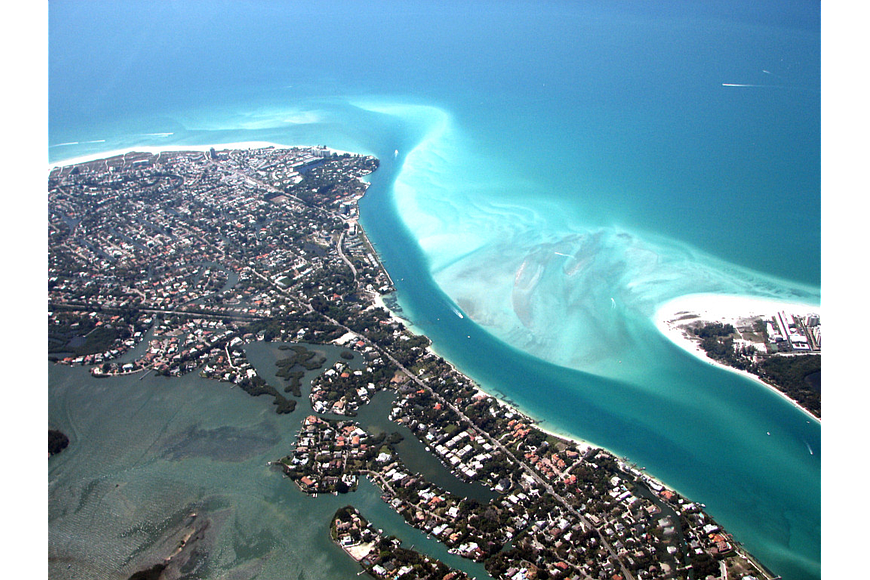- December 26, 2024
-
-
Loading

Loading

The U.S. Army Corps of Engineers has allocated $13.5 million for a Lido Key renourishment project, clearing another important hurdle for contentious plans to dredge Big Pass.
The Army Corps released its work plan for fiscal year 2018 on Monday. The agency selected the Lido Key renourishment as one of five new construction projects it is required to begin each year.
Since 2013, the city of Sarasota has been working with the Army Corps on a project to take sand from Big Pass to replenish critically eroded portions of the Lido Key shoreline. The plans would allow the Army Corps to use 950,000 cubic yards of sand from Big Pass in an initial dredge, with smaller short-term renourishment projects every five years for a 50-year period. The project would also include the installation of two sand-retaining groins on Lido.
The project is estimated to cost $22 million, with about 60% of that funding coming from the Army Corps.
Siesta Key residents have strongly objected to the idea of using sand from Big Pass, which has never been dredged before. The Siesta Key Association, a residents group, challenged the Florida Department of Environmental Protection’s intent to issue a permit for the project in the state’s Division of Administrative Hearings. In May, a judge recommended approving the permit with minor changes.
Although a permit has not yet been issued for the Big Pass dredge, the city tentatively believes it could begin the shoreline stabilization process on Lido Key next spring, spokeswoman Jan Thornburg said. The city plans to conduct a smaller Lido renourishment project using sand from New Pass this fall.
In a statement, City Manager Tom Barwin expressed excitement about the Army Corps allocation.
“This is very great news, especially considering the dire condition of portions of the Lido Beach shoreline right now,” Barwin said in the statement. “With federal funding in place, we’ll be able to proceed with the long-term shoreline protection project in the near future. Monitoring will be a significant aspect, as well as having a thoughtful approach to maintain all of Sarasota County’s shorelines over the coming decades.”
Carl Shoffstall, president of the Lido Key Residents Association, was also happy to hear the news.
“I think it’s the greatest thing since sliced bread,” Shoffstall said.
At a Thursday Siesta Key Association meeting, the group discussed its options for continuing to contest the project. Board members reaffirmed their belief the project was potentially harmful for Siesta Key and the Sarasota region, calling the material provided in support of the plans insufficient to allay concerns.
“We’ve been advocating for a best project, not just any project,” board member Catherine Luckner said.
The Army Corps work plan undermines one argument Siesta Key residents have repeatedly advanced. Luckner and others have said any legal action from Siesta residents would not be delaying a dredge, because the project has not had any federal funding allocated toward it. At Thursday’s meeting, ahead of the publication of the work plan, SKA members reiterated their belief that any federal money was still years away from being secured.
“I’m telling you, for three years, there has never been any funding allocated for them,” Luckner said. “In every paper, about every two weeks, they go, ‘It’s coming this winter, if we can just get a yes.’ That’s not true; it’s a lie.”
SKA President Gene Kusekoski was surprised to hear about the allocation, but said Siesta residents would keep on pursuing options for opposing the dredge.
“I guess the process for issuing the permit will proceed, and then we’ll see what happens,” Kusekoski said.
Representatives for the Army Corps and the Florida Department of Environmental Protection could not immediately be reached for comment. The city could not immediately provide additional details on the procedural steps necessary to begin the renourishment project.
The city is also in the process of pursuing shorter-term shoreline protection options on Lido Key, a subject of heightened concern among island residents following Subtropical Storm Alberto. Shoffstall expressed optimism the funding allocation was a sign Lido was close to securing a long-term solution for its sand needs.
“Hopefully, we’re going to move forward,” Shoffstall said.
This article has been edited to update the city’s anticipated timeline for renourishing Lido Key.